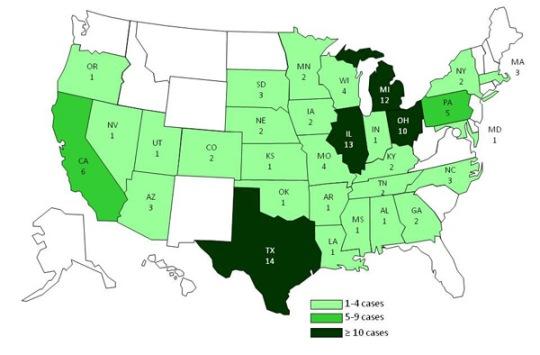Aug 11, 2011 (CIDRAP News) – The case count in the outbreak of antibiotic-resistant Salmonella linked to ground turkey has risen to 107, up 29 from a week ago, following the identification of a second Salmonella DNA fingerprint in the outbreak, the Centers for Disease Control and Prevention (CDC) reported today.
The CDC said 23 patients were infected with Salmonella Heidelberg that has a pulsed-field gel electrophoresis (PFGE) pattern (DNA fingerprint) "closely related" to the pattern seen in the other 84 patients, and these 23 have been added to the outbreak count.
The 107 cases were scattered across 31 states, 5 more than noted a week ago. States with the most cases include Texas with 14, Illinois (13), Michigan (12), Ohio (10), and California (6); the number of deaths has stayed the same, at 1.
As previously reported, the outbreak has been linked to ground turkey from a Cargill Meat Solutions plant in Springdale, Ark., which announced a recall of almost 36 million pounds of the product on Aug 3.
Among 64 patients for whom information was available, 25 (39%) were hospitalized, an increase of 3 since last week, the CDC reported. Illness-onset dates in the outbreak go back to Feb 27, 10 days earlier than reported in the last update, the agency said.
The two closely related PFGE patterns were found in the same ground turkey sample collected from the home of an Ohio patient, according to the CDC. The leftover sample, which was unlabeled, first tested positive for the outbreak strain on Jul 29. "In addition to the outbreak strain with the 'initial' PFGE pattern, a second closely related PFGE pattern of Salmonella Heidelberg was identified in the contaminated leftover product," the agency said.
Since Feb 27, 23 people with the closely related PFGE pattern have been reported to PulseNet, the CDC database of PFGE patterns from foodborne pathogens, the statement said. Eight of those patients have been interviewed, and six of them reported eating ground turkey in the week before they got sick.
Further, the CDC said the closely related PFGE pattern was found in a retail sample of ground turkey taken in surveillance by the National Antimicrobial Resistance Monitoring System (NARMS), and this sample came from the Cargill plant in Arkansas. (The agency had reported previously that four retail ground turkey samples tested in the NARMS program were found to have the outbreak strain in recent months.)
Taken together, the findings prompted the CDC to add the 23 patients with the second PFGE pattern to the outbreak case count, today's statement said.
It was not immediately clear how unusual it is to find more than one Salmonella PFGE pattern in an outbreak, but it is not unprecedented. For example, in a Jul 26 update on the Salmonella Agona outbreak linked to papayas, the CDC said the outbreak strain involves four closely related PFGE patterns that have rarely been identified before in PulseNet.
In other comments today, the CDC said that 40 of 71 (56%) patients who provided information reported consuming ground turkey, versus 52% of patients as of last week's update. By contrast, only 11% of respondents in a recent survey of healthy people reported eating ground turkey.
The agency has tested for antibiotic resistance in Salmonella Heidelberg isolates from four retail ground turkey samples and from nine people infected in the outbreak. Results so far show that the turkey and human isolates are resistant to ampicillin, streptomycin, and tetracycline, and that the turkey and some of the human isolates are also resistant to gentamicin.
However, all the human isolates are sensitive to several common antibiotics, including ciprofloxacin, ceftriaxone, and trimethoprim-sulfamethoxazole, the statement said.
In other developments, a coalition of seven food safety groups in a letter today urged the US Department of Agriculture (USDA) to classify four antibiotic-resistant Salmonella strains as adulterants in meat, which would trigger routine testing by the USDA and likely hasten recalls. The strains are Heidelberg, Hadar, Newport, and Typhimurium.
The Safe Food Coalition, as the group is called, urged Agriculture Secretary Tom Vilsack to promptly consider the petition filed in May by the Center for Science in the Public Interest, which called for the same action. Today's letter said Salmonella Hadar and Heidelberg have been among the most common serotypes found in retail meat products in recent years.
The coalition includes the Center for Foodborne Illness Research and Prevention, Consumer Federation of America, Consumers Union, Food and Water Watch, Government Accountability Project, National Consumers League, and STOP Foodborne Illness.
See also:
Aug 11 CDC update on Salmonella Heidelberg outbreak
Jul 26 CDC update on Salmonella Agona outbreak
Aug 11 Safe Food Coalition press release
























